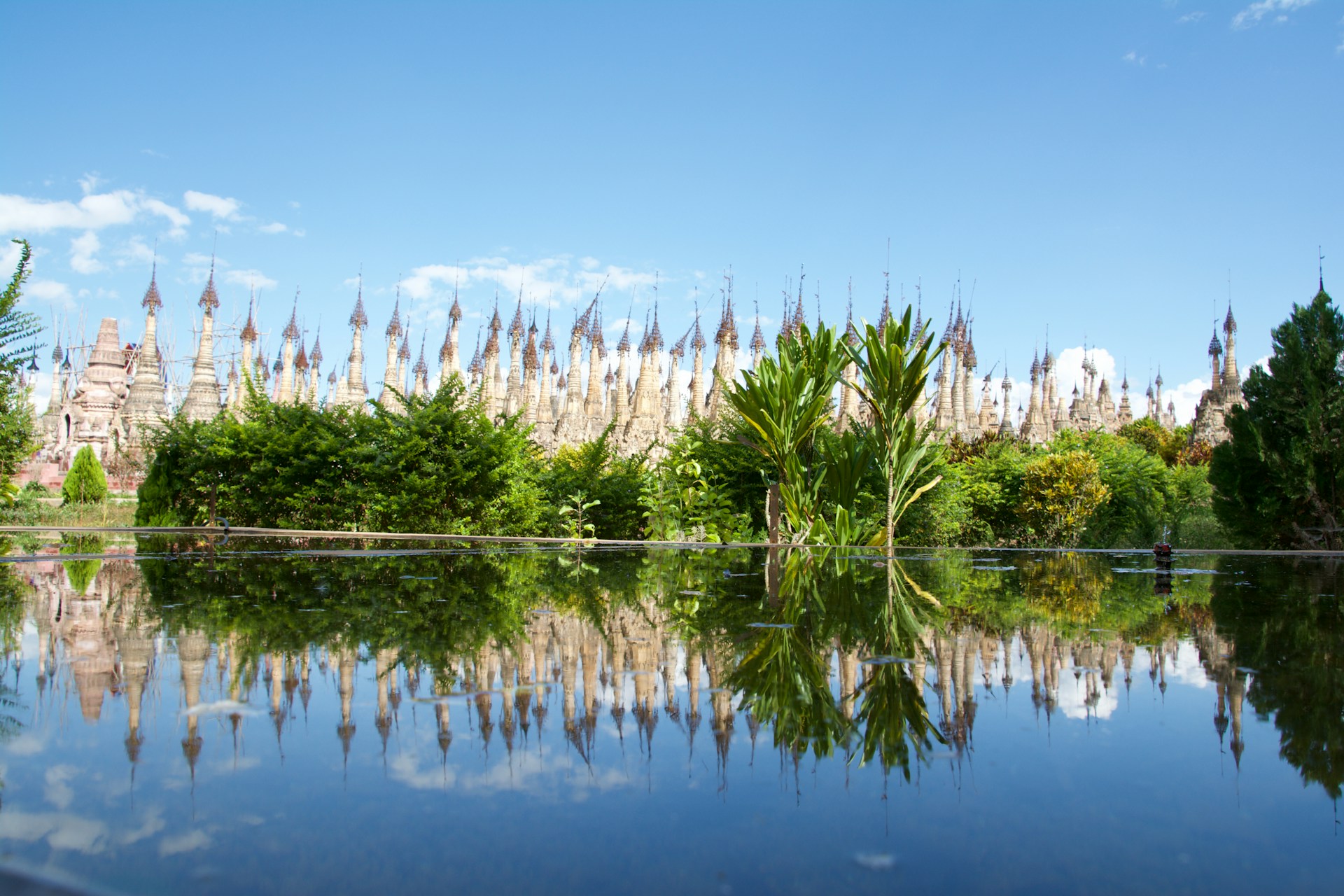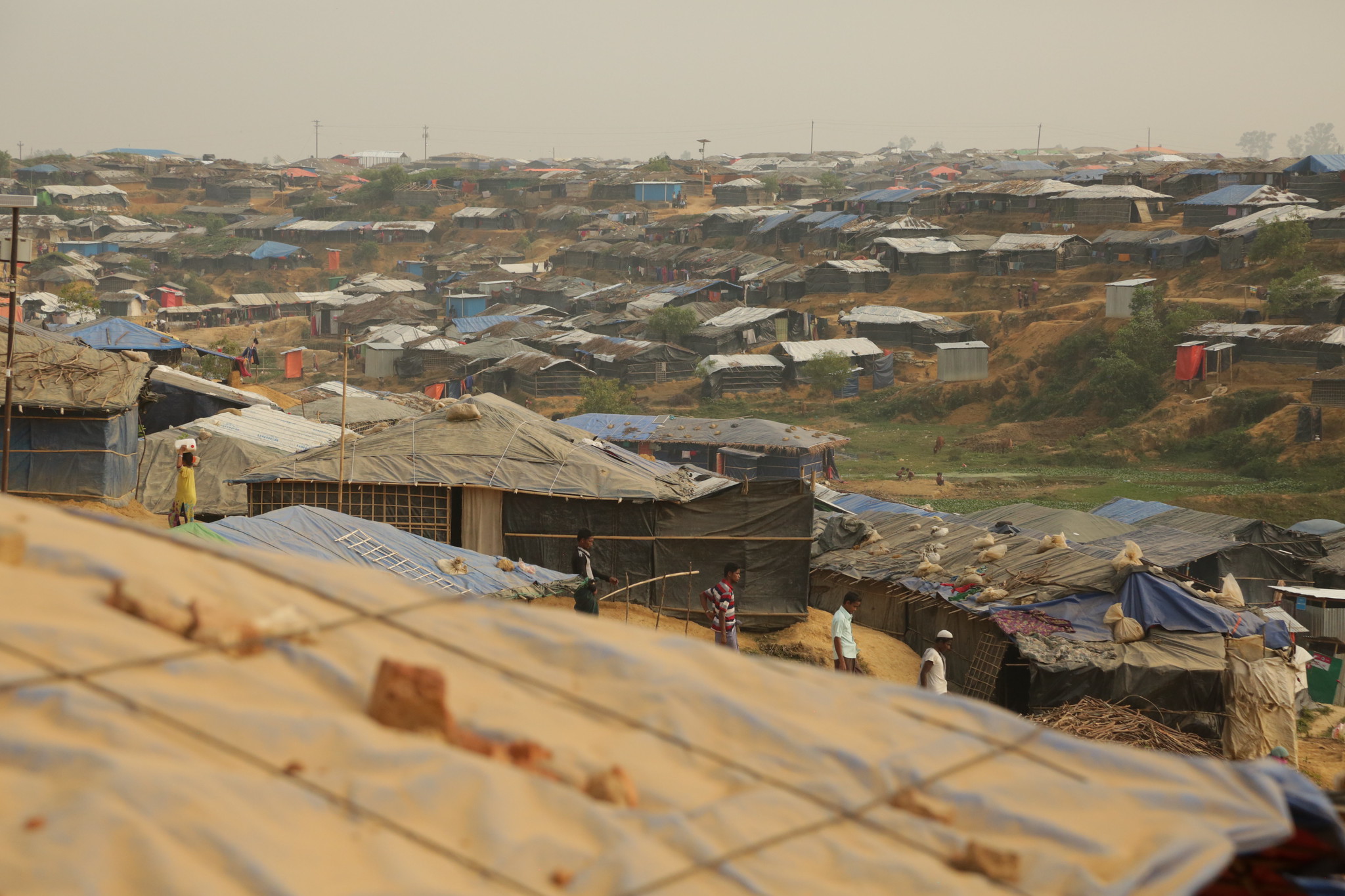Opposition to military rule in Myanmar has been a constant, but since 2021 progressive young people have deployed a variety of methods to undermine the superior position of the military junta, playing on social, religious and patriarchal prejudices to send their message. This post by Htet Hlaing Win coincides with an ongoing exhibition in LSE’s Atrium Gallery (‘Not Another Protest Exhibition: Myanmar in Revolt and Feminist Art Practice‘) on the artworks of the Burmese artist Chuu Wai, curated by LSE doctorand Sara Wong, which explores how art is/can be used to navigate repressive state practices in Myanmar. (See also ‘Weaving Art and Resistance in Myanmar‘, published today.)
In March–April 2021, courageous young people of Myanmar showed their opposition to the military junta’s coup of February 2021 through street protests and demonstrations, facing bullets and teargas. To protect themselves, demonstrators wore helmets and gas masks, wielded shields and constructed makeshift barricades. The most curious, and somewhat baffling, element of the barricades were the rows of htamain (ထဘီ, lit., thabhī), a traditional garment worn by women in Myanmar, hanging in the air, above them, such that anyone walking across them would have to walk under them.
Htamain are regarded as the most ‘lowly’ clothing for purely patriarchal reasons; in households, there is an unspoken rule that when washing htamain, they should not be mixed with other clothes, and should not be hanged to dry at the front of the house. Traditionally, the act of passing or walking under htamain, or even touching them, is believed to reduce one’s hpone (ဘုန်း, lit., bhun‘, a kind of grace implicit in a person, especially a man) and can lead to bad luck and misfortune. Htamain were therefore hung as street barricades to deter police and soldiers. Composed mostly of Bamar–Buddhist men, these security personnel would think twice before walking under htamain.
There is another way to make sense of this innovative political use of hanging htamain in public. Having access to internet, the protestors desired freedom equal to their Western peers, and hated the constraints put upon them by traditional values. The customary practice of hanging htamain at the back of the house for drying is considered by young people as discriminatory against women. It was these young people who participated in the street protests, ignored the traditional belief and, together with their female comrades, personally touched and hung htamain as barricades. By doing this, they declared that they do not want a society built on patriarchal values which, to them, also represents the military.
The act of turning traditional values on its head can be interpreted as resisting the military in general, and the coup in particular. Hanging htamain overhead is only one of many such passive resistance activities of young people.
*
The military, or Tatmadaw, is the strongest and oldest institution in independent Burma/Myanmar. Although official historiography traces its lineage to the Burma Independence Army (BIA) established by the legendary Thirty Comrades who secretly travelled to Japan to receive military training and founded BIA in Thailand in 1941, the Tatmadaw did not become the powerful force it is today until the late 1970s. For 30 years after independence in 1948, the military had to fight the China-backed Communist Party of Burma and several ethnic armed groups.
The military justified its oppressive rule by saying that only it can prevent the country from a Communist take-over, and disintegration. At the same time, after General Ne Win’s coup in 1962 and the establishment of the Burma Socialist Programme Party (BSPP), the military advanced its role as a vanguard force on the march to a socialist utopia. BSPP rule ended with a nationwide uprising in 1988, and a new generation of military officers seized power and organised themselves as the State Law and Order Restoration Council (SLORC). Although this new regime was no less oppressive than its predecessor, it changed its base of legitimacy: while vowing to prevent the country from disintegration and maintaining its sovereignty (like its predecessor BSPP), SLORC set its own goals and agenda — namely, to protect traditional culture & values (မြန်မာ့ရိုးရာယဥ်ကျေးမှု, lit., mrnʻ mā’ ruiʺrā yaanʻ keyʺ mhu) and religion, i.e., Buddhism (သာသနာ, lit., sasana). Consequently, the act of harming or insulting Buddhism and Buddhist monks was criminalised, and laws and measures were introduced to protect so-called ‘Myanmar’s traditional values’, even if some of the laws hark back to colonial times.
Most of these measures are criticised as conservative and legalised, gender-based discrimination. Since conservative elements in Myanmar (junta officials, monks, military supporters and ultra-nationalists) are very sensitive about sexual matters, it is natural that there are bizarre laws concerning sex (and related matters): for example, a person found with a condom can be put in prison. Although there were demands to amend or abolish such laws during Thein Sein (2011–16), Htin Kyaw (2016–18) and Win Myint (2018–21) presidencies, there is no hope of achieving this after the coup of February 2021.
Teaching sex education in schools and putting sex education-related materials in the curriculum also faces strong opposition from ultra-conservative/nationalist elements. They believe that discussing such ‘shameful’ things is not good for the moral upbringing of teenagers, and is contrary to Myanmar’s culture. However, they cannot offer an alternative way to educate teenagers to deal with sexual health/hygiene issues. Although there are a few Facebook pages trying their best to provide sex education, they are constantly harassed and mocked by ultra-nationalists. At school, sex education-related contents are usually skipped and not taught by teachers, who are themselves reluctant to talk about these matters.
*
Insulting state-backed Theravada Buddhism is also considered a major crime by the military government. There are demands from progressive elements, especially young people, that broadcasting religious music and sermons on public loudspeakers by monasteries should be prohibited. They argue that such noisy broadcasting has a negative effect on the health of elders. However, because of opposition from ultra-nationalists and monks, successive civilian governments have not met the demand; even the National League for Democracy (NLD) government had to bow to the will of military-backed ultra-nationalist monks and activists. In 2016, a foreigner was arrested for unplugging a loudspeaker playing religious music, and later expelled from the country. In August 2023, a Swiss national and a group of Myanmar citizens were arrested for directing, producing and uploading a short film on YouTube harmful to the dignity of Buddhism. According to Myanma Alinn, the junta’s mouthpiece, the characters in the film ‘behaved inappropriately’ and their behaviour ‘degraded the dignity and morals of monks’.
Progressive young people are nowadays creating online forums debating issues ranging from the corrupt behaviour of monks and their luxurious lifestyles to the incompatibility of Buddhist doctrines with modern science. They are determined to delegitimise the military-sponsored Theravada Buddhist institution which they consider oppressive and want to abolish. After the coup in February 2021, prominent monks remained silent about crimes committed by the military on innocent civilians; some monks even attended events hosted by the junta chief, Min Aung Hlaing, and blessed the pagodas he built. Such behaviour from monks has led to more young people wanting to distance themselves from religion.
*
Whilst promoting Theravada Buddhism, the military oppresses and limits the activities of other religions and communities. In the past, there have been instances of demolition of Christian churches, replacing them with Buddhist pagodas (especially in border areas); and there have been other informal discriminatory measures towards non-Bamars and non-Buddhists — for instance, it is more difficult for them to obtain a National Registration Card and, in the past, they were barred from pursuing medical careers. Homosexuals are also discriminated against, and humiliated. According to popular Buddhist thinking, people become homosexuals because they harassed, mistreated and raped other people’s wives/daughters in their past lives. Similarly, differently abled people are treated as having committed harmful acts upon others in previous births; they are laughing stock on media, mere objects to be humiliated.
Although the government does not openly encourage such portrayals, it does not prohibit, nor act against it either. And women continue to be treated as lower in dignity than men; they continue to be prohibited from entering certain religiously significant places, such as orientation halls (သိမ်; saim‘).
Several young people also refuse to use the word kala (ကုလား, lit., kulā”), which they consider a derogatory term: originally used to refer to lighter-skinned people from the West (Europeans and Americans) as white kala, it gradually began to be used for Indians who, with a darker skin tone, were simply called kala. Nowadays, only people of Indian origin and Muslims are referred to by the word. By treating homosexuals, women and people of Chinese and Indian descent with dignity, and dispelling and countering distorted images of them created by Buddhist indoctrination, anti-junta youth are passively opposing the military.
*
Most Burmese women do not derive pleasure from sexual intercourse with their husbands: traditionally, it has been taught that the primary objective of marriage is not to get sexual pleasure but to have a partner to rely on in time of need, and procreation. Religious teaching encourages the view that husband and wife should help one another to escape the cycle of life and death (သံသရာ; saṃsarā) and attain nirvana through charitable acts (ဒါန; dhāna), abstaining from immoral behaviour (သီလ; sīla) and spreading meditation (ဘာဝနာ, lit., bāvanā). As a result, it is considered immoral and even shameful for a woman to desire pleasure from it. Moreover, having sexual intercourse before marriage is also regarded by monks and most people as immoral, even if both parties are adults and consent to it; sex before marriage, they believe, is a corrupt Western practice and should not be accepted in Myanmar.
Conversely, progressive young people are creating online fora to encourage talk of sexual matters. On these fora, people are allowed to discuss their sexual experiences freely, and ask questions about their sexual, relationship and marital problems. Both medical professionals and others offer opinion and answer questions. Those who do not want their identity to be known can participate anonymously. This is also an act of resistance as these people have broken the norm of not discussing sexual matters in public.
Some youth are striving to counter the dominance of Theravada Buddhism by promoting another Buddhist sect, the moe-pya-gaing (မိုးပြာဂိုဏ်း, lit., mui” prā guiṇ‘, ‘Sky-blue sect’), who are known by their blue robes. By refusing to wear the Theravada saffron-coloured robes and holding ideologies contrary to those of the Theravada monks, moe-pya monks were condemned for ‘insulting the religion or sasana’. After the 2021 coup, a group of young people are popularising the teachings of moe-pya through videos on You Tube. The military relies on the Theravada Buddhist monastical institution for legitimacy: the Tatmadaw in general, and the high-ranking military officers in particular, promote themselves as defenders of the faith, and Buddhist rituals are heavily employed as good luck rituals for victory in the battle against rebel forces. So, the effort to promote the moe-pya-gaing can be seen as an attempt to undermine the military.
*
It is important to bear in mind that the ‘Spring Revolution’ is not just about overthrowing the military junta; it is also about changing values and norms detrimental to the development of a society built on respect of fundamental human rights and democracy. Hanging htamain at the front of the house and other acts of resistance are the first steps in reaching this goal.
*
The views expressed here are those of the author and do not represent the views of the ‘South Asia @ LSE’ blog, the LSE South Asia Centre or the London School of Economics and Political Science. Please click here for our Comments Policy.
This blogpost may not be reposted by anyone without prior written consent of LSE South Asia Centre; please e-mail southasia@lse.ac.uk for permission.
Banner image © The Irrawaddy, ‘Taketa Township, Yangon’, 3 March 2021; used with permission by the author. This image may not be used by anyone else.
*







